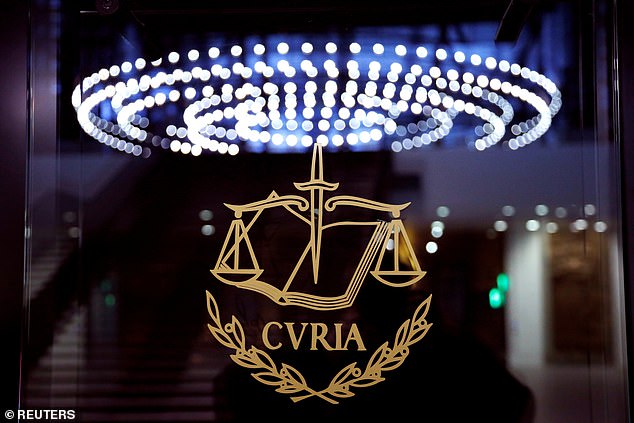[ad_1]
A British lesbian mother is embroiled in an EU court battle after her baby girl was left without a nationality because Bulgaria does not recognise same-sex marriages.Â
The baby girl was left without a nationality after she was born in Spain to an unnamed same-sex couple from Bulgaria and Gibraltar, and will be at the centre of a test case to be heard by the European Union‘s top court on Tuesday.
Lawyers say Bulgaria has put one-year-old ‘Baby S’ at risk of prolonged statelessness after refusing to provide a birth certificate and citizenship because of discrimination towards her parents’ sexual orientation.
The hearing at the Luxembourg-based court is being seen as an important test case for many other so-called ‘rainbow families’ in Europe who face similar dilemmas.
Experts on statelessness say if ‘Baby S’ cannot acquire citizenship she may not be able to go to school, access healthcare and state benefits, or get jobs later in life.

A baby was left without a nationality after she was born in Spain to an unnamed same-sex couple from Bulgaria and Gibraltar. She will be at the centre of a test case to be heard by the European Union’s top court (pictured, file photo of court’s logo in ) on Tuesday in Luxembourg
Her parents, who live near Barcelona, have not yet been able to introduce their daughter to their families abroad because they cannot get her a passport.
After she was born in December 2019, ‘Baby S’ received a birth certificate in Spain listing both her mothers.
However when her Bulgarian mother, who uses the pseudonym Kalina, requested a Bulgarian birth certificate for her daughter so she could apply for citizenship, she said officials told her a baby could not have two mothers.
Bulgaria’s constitution defines marriage as the union of a man and a woman.
‘It’s caused us a lot of upset. This discrimination feels very personal and has shocked us,’ Kalina told the Thomson Reuters Foundation.
‘I want to tell (the court) I’m her mother no matter which country I’m in. It’s very unfortunate that I can be her mother in Spain … but I can’t be her mother in my own home country.’
The couple cannot obtain Spanish citizenship for their daughter as neither of them is a Spanish national.
Gibraltar is a British Overseas Territory located on Spain’s southern tip but British laws mean Kalina’s wife cannot pass on her British citizenship as she acquired it by descent.
Kalina’s lawyer will urge the Court of Justice of the European Union to request Bulgaria provide ‘Baby S’ with a birth certificate and nationality.
The Luxembourg-based court, which ensures EU countries comply with the bloc’s laws, is also considering a similar case where Poland refused to issue a birth certificate for a child born in Spain to Polish and Irish mothers.
‘This ruling will be important for many people,’ said Kalina’s lawyer Denitsa Lyubenova.
‘There are a lot of same-sex couples in Europe in the same position, whose children are at risk of statelessness because EU member states in central and eastern Europe do not recognise their family status.’
European Commission President Ursula von der Leyen has said she will push for mutual recognition of family relations in the European Union under a new strategy to strengthen LGBT+ rights.
‘If you are (a) parent in one country, you are (a) parent in every country,’ she told the European Parliament last year.Â

European Commission President Ursula von der Leyen (pictured) has said she will push for mutual recognition of family relations in the European Union under a new strategy to strengthen LGBT+ rights
Bulgaria was once a leader of LGBT+ rights having legalised homosexuality in 1968, before other emerging European nations.
But in recent years, there has been a shift in public opinion, with the government often using LGBT+ people as a scapegoat, according to Emerging Europe.
Same-sex marriage is currently illegal in the country, and while the Government in 2014 committed itself to outlawing hate crimes against LGBT people, the newly established government in October 2014 – that has been in power since – has been silent on the issue, with LGBT+ people still not protected from hate crimes today.
In 2018, Bulgaria’s ruling GERB party withdrew from parliament a European treaty – the Istanbul convention – designed to combat violence against women in the face of opposition from its allies in government and religious groups. Â
The dispute appeared to centre on the treaty’s definition of ‘gender’ as ‘social roles, behaviours, activities and characteristics that a particular society considers appropriate for women and men’.
Some observers said the translation of the text into Bulgarian could be to blame.
The Bulgarian version uses the Bulgarian for ‘sex’ – the biological difference between man and woman – as the translation for ‘gender’, which can refer more broadly to the social roles of men and women.Â
Bulgaria does not have a specific equivalent for the word gender.
Critics, including the influential Bulgarian Orthodox Church, said such language could encourage young people to identify as transgender or third sex and lead to same-sex marriage in the country of 7.1 million people.
‘In practice, this makes it possible to legalise same-sex marriages – if one of the two married partners in a legally married couple changes their sex, according to the Istanbul Convention, a same-sex family is created,’ the nationalist VMRO party, part of an alliance with the co-ruling United Patriots, said in a statement in 2018.
[ad_2]
Source link






